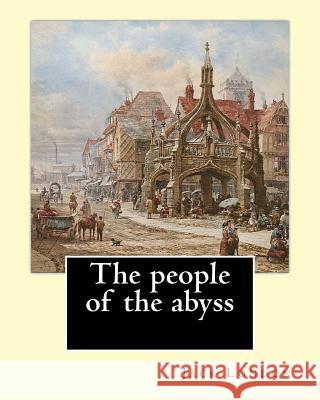The people of the abyss. By: Jack London, and By: James Russell Lowell (with many illustrations from photographs): The People of the Abyss (1903) i » książka
The people of the abyss. By: Jack London, and By: James Russell Lowell (with many illustrations from photographs): The People of the Abyss (1903) i
ISBN-13: 9781542766241 / Angielski / Miękka / 2017 / 156 str.
The people of the abyss. By: Jack London, and By: James Russell Lowell (with many illustrations from photographs): The People of the Abyss (1903) i
ISBN-13: 9781542766241 / Angielski / Miękka / 2017 / 156 str.
(netto: 49,24 VAT: 5%)
Najniższa cena z 30 dni: 48,46 zł
ok. 13-18 dni roboczych.
Darmowa dostawa!
The People of the Abyss (1903) is a book by Jack London about life in the East End of London in 1902. He wrote this first-hand account after living in the East End (including the Whitechapel District) for several months, sometimes staying in workhouses or sleeping on the streets. The conditions he experienced and wrote about were the same as those endured by an estimated 500,000 of the contemporary London poor.There had been several previous accounts of slum conditions in England, most notably The Condition of the Working Class in England in 1844 by Friedrich Engels. However, most of these were based on secondhand sources. Jack London's account was based on the firsthand experience of the writer, and proved to be more popular. Jacob Riis's sensational How the Other Half Lives (1890) has been suggested as a source of inspiration for The People of the Abyss. A contemporary advertisement for Jack London's book said that it "tingles" with the "directness only possible from a man who knows London as Jacob Riis knows New York," suggesting that his publisher, at least, perceived a resemblance. When London wrote The People of the Abyss, the phrase "the Abyss," with its hellish connotation, was in wide use to refer to the life of the urban poor. H. G. Wells's popular 1901 book, Anticipations, uses the expression in this sense some twenty-five times, and uses the phrase "the People of the Abyss" eight times.One writer, analyzing The Iron Heel, refers to "the People of the Abyss" as "H. G. Wells' phrase." George Orwell was inspired by The People of the Abyss, which he read in his teens, and in the 1930s he began disguising himself as a derelict and made tramping expeditions into the poor section of London himself, in emulation of Jack London. The influence of The People of the Abyss can be seen in Down and Out in Paris and London and The Road to Wigan Pier. The British newspaper journalist and editor Bertram Fletcher Robinson wrote a review of The People of the Abyss for the London Daily Express newspaper. In this piece, Fletcher Robinson states that it would be "difficult to find a more depressing volume..." James Russell Lowell (February 22, 1819 - August 12, 1891) was an American Romantic poet, critic, editor, and diplomat. He is associated with the Fireside Poets, a group of New England writers who were among the first American poets who rivaled the popularity of British poets. These poets usually used conventional forms and meters in their poetry, making them suitable for families entertaining at their fireside. John Griffith "Jack" London (born John Griffith Chaney, January 12, 1876 - November 22, 1916)was an American novelist, journalist, and social activist. John Griffith "Jack" London (born John Griffith Chaney, January 12, 1876 - November 22, 1916)was an American novelist, journalist, and social activist. A pioneer in the then-burgeoning world of commercial magazine fiction, he was one of the first fiction writers to obtain worldwide celebrity and a large fortune from his fiction alone, including science fiction. Some of his most famous works include The Call of the Wild and White Fang, both set in the Klondike Gold Rush, as well as the short stories "To Build a Fire," "An Odyssey of the North," and "Love of Life." He also wrote of the South Pacific in such stories as "The Pearls of Parlay" and "The Heathen," and of the San Francisco Bay area in The Sea Wolf. London was part of the radical literary group "The Crowd" in San Francisco and a passionate advocate of unionization, socialism, and the rights of workers. He wrote several powerful works dealing with these topics, such as his dystopian novel The Iron Heel, his non-fiction expose The People of the Abyss, and The War of the Classes.











